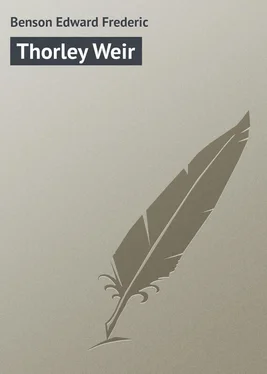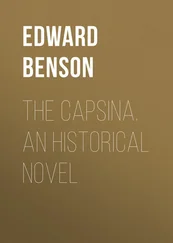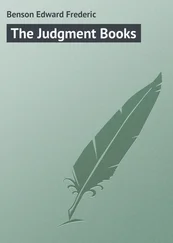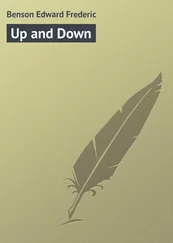Edward Benson - Thorley Weir
Здесь есть возможность читать онлайн «Edward Benson - Thorley Weir» — ознакомительный отрывок электронной книги совершенно бесплатно, а после прочтения отрывка купить полную версию. В некоторых случаях можно слушать аудио, скачать через торрент в формате fb2 и присутствует краткое содержание. Жанр: foreign_prose, на английском языке. Описание произведения, (предисловие) а так же отзывы посетителей доступны на портале библиотеки ЛибКат.
- Название:Thorley Weir
- Автор:
- Жанр:
- Год:неизвестен
- ISBN:нет данных
- Рейтинг книги:3 / 5. Голосов: 1
-
Избранное:Добавить в избранное
- Отзывы:
-
Ваша оценка:
- 60
- 1
- 2
- 3
- 4
- 5
Thorley Weir: краткое содержание, описание и аннотация
Предлагаем к чтению аннотацию, описание, краткое содержание или предисловие (зависит от того, что написал сам автор книги «Thorley Weir»). Если вы не нашли необходимую информацию о книге — напишите в комментариях, мы постараемся отыскать её.
Thorley Weir — читать онлайн ознакомительный отрывок
Ниже представлен текст книги, разбитый по страницам. Система сохранения места последней прочитанной страницы, позволяет с удобством читать онлайн бесплатно книгу «Thorley Weir», без необходимости каждый раз заново искать на чём Вы остановились. Поставьте закладку, и сможете в любой момент перейти на страницу, на которой закончили чтение.
Интервал:
Закладка:
It was on the evening of Charles' return from Paris, as they sat in the still house that till to-day had always rung with jollity, while heathery sweetness and the resinous odour of pines came in at the open windows, that she told them everything, quite shortly, and when that was done and they were still half stunned with the sudden horror that had blackened life, she rallied her own courage by awakening theirs.
"You know it all, my darlings," she said, "and now whenever you think of it, and for a long time it will always be in your thoughts, you must think of it all as some dreadful mistake that dear Dad made, something he never meant at all. He got his troubles muddled up in his head till he didn't know what he was doing. He felt he couldn't bear it, just as sometimes he used to call out when we were playing some silly game like Animal Grab 'I can't bear it: I can't bear it.' Oh, Charles, my darling, don't cry so awfully. We've got to go straight ahead again, with all our courage undismayed, and show that we can face anything that God chooses to send us."
She waited a little, comforting now one and now the other.
"It was all a mistake," she went on, "and we must never allow ourselves to think that it was the dear Dad we knew who did it. He wasn't himself: trouble had made him forget himself and all of us just for a moment. We will think about that moment as little as we can, and then only as a mistake, but we will think constantly and lovingly of the dear Dad we have known all these years, who was so loving and tender to all three of us, and whom we knew as so gay and light-hearted. We will have him constantly in our thoughts like that, this and all the loving-kindness of the years in which we laughed and loved together. And if we can't help, as we shan't be able to do, thinking with a sort of wondering despair of that blunder, that mistake, we must remember that, somehow or other, though we can't explain how, it is and was even then in the hands of God."
It had been no vague piety or bloodless resignation that had inspired her then, nor in the year that followed, and it had required a very full measure of the essential spirit of youth, which never sits down with folded hands, but despises resignation as it despises any other sort of inaction, to bring them all to the point where they stood to-day. Whether the boys helped their mother most, or she them, is one of those problems of psychological proportions into which it is unnecessary to enquire, since each had been throughout the year, essential to the others. For if there had been no jolly boys coming home at evening to Mrs. Lathom in their lodgings in the meagre gentility of Sidney Street, she could no more have got through her industrious day with hope never quenched in her heart than could they if there had been no mother waiting to welcome them. She without waiting a day after they moved to London invested a few pounds of their exiguous capital in buying a typewriting machine, and before long, by dint of unremitting work was earning a wage sufficient, with Reggie's office salary, to keep the three of them in independence and adequate comfort, as well as to pay for a slip of a dilapidated studio in a neighbouring street, where Charles toiled with all the fire of his young heart and swiftly-growing skill of hand at his interrupted studies.
It was for him, of all the three, that life was most difficult since he was an expense only to the others and it required all the young man's courage to persevere in work which at present brought in almost nothing. But his mother's courage reinforced his: while it was possible for him to continue working, it would be a cowardly surrender to give up tending the ripening fruit of his years in Paris, and let the tree wither, and turn his brushes, so to speak, into pens, and his palette into an office stool. Besides, he had within him, lying secret and shy but vitally alive, the unalterable conviction of the true artist that his work was ordained to be art, and that where his heart was there would sufficient treasure be found also. But it was hard for him, even with the endorsing sincerity of his mother's encouragement, to continue being the drone of the hive so far as actual earning was concerned, and it had demanded the utmost he had of faith in himself and love for his art to continue working with that ecstasy of toil that art demands at all that which his education needed, and not to grudge days and weeks spent in work as profitless from the earning point of view as he believed it to be profitable in his own artistic equipment. Drawing had always been his weak point, and hour after interminable hour from casts or from the skeleton, properties saved from the lavish Paris days, he would patiently copy the framework of bones and patiently clothe them in their appropriate muscles and sinews. As must always happen, long weeks of work went by without progress as noticed by himself, until once and once again he found himself standing on firm ground instead of floundering through bogs and quick-sands which endlessly engulfed his charcoal and his hours, and knew that certain haltings and uncertainties of line troubled him no longer. But he made no pause for self-congratulation but continued with that mingling of fire and unremitting patience which is characteristic of the true and inspired learner. Colour and the whole complex conception of values, which go to make up the single picture, instead of a collection, however well rendered, of different objects was naturally his: he had by instinct that embracing vision that takes in the subject as a whole.
The heat of the morning disposed to quiescence, and the two boys with the spice of meadow-sweet and loosestrife round them, and the coolness of the running water, drowsily booming, to temper the growing swelter of the day, talked lazily and desultorily, concerned with these things, for a long time after breakfast was over. But they were vividly concerned with them no more: to each the opening pageant of life was more engrossing than the tragedy of the past, being young they looked forward, where the middle-aged would have dwelt with the present, and the old have mumbled and starved with the past. But to them it was but dawn, and the promise of day was the insistent thing, and there was no temptation to dwell in ruins, and conjure back the night. But before long the itch for activity, in spite of their resolve of a lazy morning, possessed each, and Reggie fervidly washed up the used crockery of breakfast, while Charles went up the few yards of path that lay between the tent and the side of the weir, to behold again the picture he had left standing on its easel. In his heart he knew it was finished, but in the eagerness of his youth he almost looked forward to some further brushful of inspiration. He would not touch what he knew was good: he hoped only to find something that could be touched with advantage.
He turned a sharp corner, where willows screened the weir; his picture was planted within a dozen yards of him. But between him and his picture was planted a big white-faced man who was regarding it so intently that he did not hear the swish of the parted willows. It was not till Charles was at his elbow that Craddock turned and saw him.
And he put into his manner the deference which he reserved for duchesses and talent.
"I have come to your private view," he said, "without being asked, and it was very impertinent of me. But really this is my second visit. I had my first private view yesterday, when I looked at your picture from a punt in which I happened to be. I had just a couple of glimpses at your work before this. You have been very fortunate in your inspiration since then. The Muse paid you a good visit this morning."
Charles said nothing, but his eyes questioned this intruder, giving him a tentative welcome. But before the pause was at all prolonged the tentative welcome had been changed into a wondering and tremulous expectancy. Were there fairies still by the Thames-side? Was this fat white man to prove a fairy?
Читать дальшеИнтервал:
Закладка:
Похожие книги на «Thorley Weir»
Представляем Вашему вниманию похожие книги на «Thorley Weir» списком для выбора. Мы отобрали схожую по названию и смыслу литературу в надежде предоставить читателям больше вариантов отыскать новые, интересные, ещё непрочитанные произведения.
Обсуждение, отзывы о книге «Thorley Weir» и просто собственные мнения читателей. Оставьте ваши комментарии, напишите, что Вы думаете о произведении, его смысле или главных героях. Укажите что конкретно понравилось, а что нет, и почему Вы так считаете.












